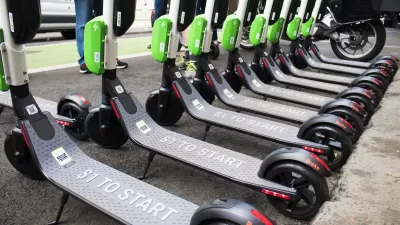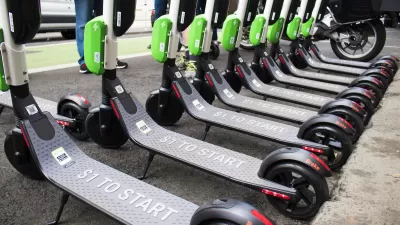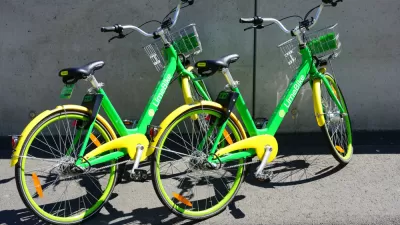Countless ideas have been proposed to bridge the first-mile, last-mile gap: bike share, dockless bike share, ride-hailing services, circulator buses, trolleys, and, of course, good old-fashioned feet. The newest entrant: electric scooters.
"Bird is based in, and was first deployed in, Santa Monica. It has spread to San Diego and elsewhere, and, with a fresh $15 million of capital, more cities are to come. Bird’s careers page lists 13 major cities nationwide where they're hiring. This invasion presents a moral quandary. I want to hate them. They are annoying and juvenile in the way that all “disruptive” technologies are annoying and juvenile. But I find myself oddly attracted to them."
"As an anarchic element of urbanism, the problems Birds pose are mostly minor and probably correctable. But they should not be allowed to fly under the radar, as so many other “disruptive” services have done. The spats between Uber and city governments have become legendary, as arrogance has run headlong into bureaucracy. The same goes for Airbnb, Lyft, and Uber. Bird is already getting into it with the City of Santa Monica (and losing), and San Diego seems none-too-pleased."
"If scooters proliferate, planners have all the more reason to reclaim pavement from cars, creating more sidewalks, bike lanes, or, indeed scooter lanes. Scooters might warrant further transit investments as they widen the traditional walk-sheds of transit stops. They might influence parking requirements and warrant the conversion of on-street parking spaces into scooter corrals. Or maybe they’re benign enough, and our existing streetscapes accommodating enough, that we can indeed let them evolve organically and not freak out about them."
FULL STORY: Short-Distance Mobility Goes to the Birds

Alabama: Trump Terminates Settlements for Black Communities Harmed By Raw Sewage
Trump deemed the landmark civil rights agreement “illegal DEI and environmental justice policy.”

Study: Maui’s Plan to Convert Vacation Rentals to Long-Term Housing Could Cause Nearly $1 Billion Economic Loss
The plan would reduce visitor accommodation by 25% resulting in 1,900 jobs lost.

Planetizen Federal Action Tracker
A weekly monitor of how Trump’s orders and actions are impacting planners and planning in America.

Waymo Gets Permission to Map SF’s Market Street
If allowed to operate on the traffic-restricted street, Waymo’s autonomous taxis would have a leg up over ride-hailing competitors — and counter the city’s efforts to grow bike and pedestrian on the thoroughfare.

Parklet Symposium Highlights the Success of Shared Spaces
Parklets got a boost during the Covid-19 pandemic, when the concept was translated to outdoor dining programs that offered restaurants a lifeline during the shutdown.

Federal Homelessness Agency Places Entire Staff on Leave
The U.S. Interagency Council on Homelessness is the only federal agency dedicated to preventing and ending homelessness.
Urban Design for Planners 1: Software Tools
This six-course series explores essential urban design concepts using open source software and equips planners with the tools they need to participate fully in the urban design process.
Planning for Universal Design
Learn the tools for implementing Universal Design in planning regulations.
Caltrans
Smith Gee Studio
Institute for Housing and Urban Development Studies (IHS)
City of Grandview
Harvard GSD Executive Education
Toledo-Lucas County Plan Commissions
Salt Lake City
NYU Wagner Graduate School of Public Service





























